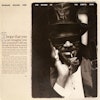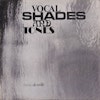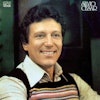Recorded before his stroke, and as his first album for an adventurous Warner Brothers at its weirdo label peak, The Return of the 5000 Lb. Man is saxophonist, flutist, and conceptualist Rahsaan Roland Kirk’s fullest flowering, a showcase of his emotional depth as an instrumentalist, his savvy as an interpretative music maker with a mighty pimp hand as a band leader, and, on the winding Afrofuturist screed, “Theme for the Eulipions” with tone poet Betty Neals, a composer (and harmonica player) at one with the cosmos and down for the double funk.
“A warm song that you are not about to forget… He calls himself a journey agent… A duty-free gift for the traveler,” a tiger-like Neals recites in dedication to Kirk before the saxophonist blasts off in a beautiful flurry of elongated blues and lounge-hound licks. Followed up by pianist Hilton Ruiz’s crisp, curt, post-bop-laced piano run, Kirk retakes the track with a mournful harmonica’s moan flush from “Moon River,” and the nearly-ten-minute track outros with an uncredited chorus melodically reciting Neals’s silly, but searing, words.
Produced, as all Kirk records were since 1965’s Here Comes the Whistleman, by the Masked Announcer, Joel Dorn, there is a warm, vibrant breeze blowing through the dense complexity of the saxophonist’s arrangements in league with Dorn’s finest R&B productions of the time. Kirk didn’t need Dorn to bring deep groovy vibrations to the party. Ever since 1961’s royal blue We Free Kings, Kirk’s mastery of soul jazz, from smooth to blistering, was unparalleled, whether he was covering Charlie Parker’s “Blues for Alice,” or composing its title tune as a merry, mawkish variation on the Christmas carol “We Three Kings.” Kirk understood the roots of rhythm and blues (as he did most music, from classical to folk) and made it roar according to his own agenda. Dorn simply kept the unwatched pot boiling and salty. And tender. Knowing that Dorn produced Roberta Flack’s moodiest of transitional musics from her jazz piano days to her ’70s R&B hitmaking run gives us insight into the shining hour of Kirk’s lovely and pensively poetic rendition of Minnie Riperton’s “Loving You.”
On The 5,000 Lb. Man, the soft wah-inflected Fender Rhodes electric piano of future Chaka Khan collaborator Arthur Jenkins give Kirk’s reading of Charlie Mingus’s “Goodbye Pork Pie Hat” (complete with Kirk’s lyrics and growly vocals in dedication to Lester “Prez” Young) a modern sheen. With Philadelphia-born organ-trio goddess Trudy Pitts noodling beside Kirk in raw-toned tenor sax mode, composers Sammy Fain and Irving Kahal’s quaint ballad “I’ll Be Seeing You” becomes a rough, funky jam. “There Will Never Be Another You” from songwriters Mack Gordon and Harry Warren is similar in its ballad’s recasting. Only this time, Kirk & Co.—including walking bassist Buster Williams—make the sad soliloquy angular and Saturnal with its ooh-ahh-ing choral voices and the saxophonist’s bouncing back and from interplanetary groans to deeply rooted mews.
Closing The 5000 Lb.er with a woozy, angled take on Coltrane’s classic “Giant Steps” was, like “There Will Never Be Another You,” a daring move, an encroachment on, and a warming up of Sun Ra’s coolly intelligent, Afrofuturist aesthetic while remaining funkily grounded in bop traditionalism. Considering that after his stroke, Kirk wrote and recorded “Boogie Woogie String Along for Real” in 1976 for a string section shows that he had plenty of zealotry left in him despite sickness and struggle. That his last composed tracks were ripe with avant-striptease soul and giddy boogie woogie-ing blues with gutsy guttural sax solos and flying strings tells you where Kirk was heading before he passed—somewhere equal to, but not surpassing, the weighty wonder of The 5000 Lb. Man.



